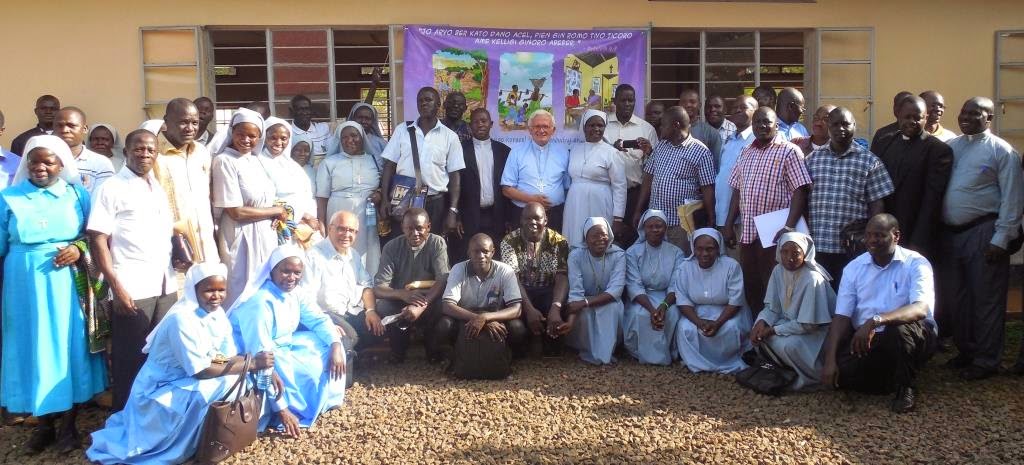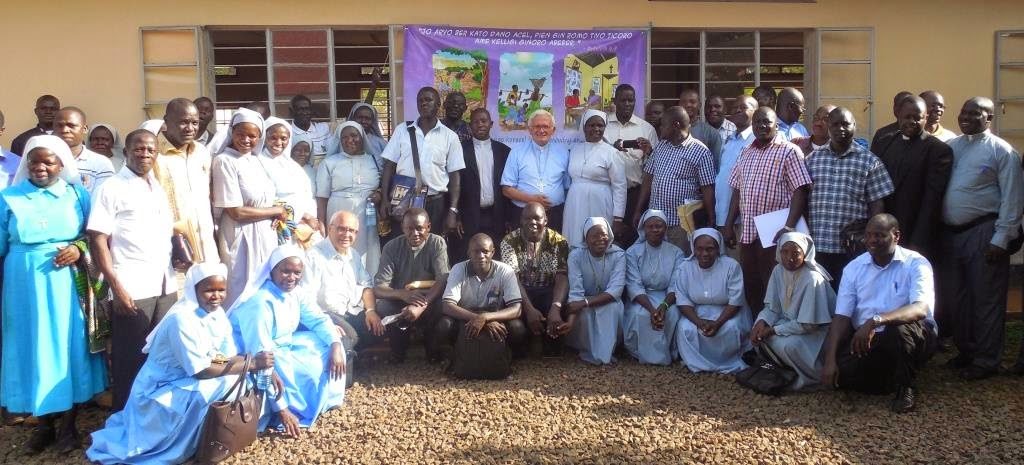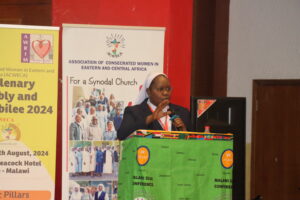UGANDA: UEC Holds Workshops in Dioceses on Domestic Violence Prevention

 |
| Group Photo of the Workshop Participants with Rt. Rev. Joseph Franzelli |
Uganda Episcopal Conference (UEC), in
partnership with the Irish organizations, Trocaire and Irish Aid, embarked on
the effort of conducting sensitization workshops in various dioceses to create
awareness about the problem of domestic violence and to bring about behaviour
change in families and communities.
partnership with the Irish organizations, Trocaire and Irish Aid, embarked on
the effort of conducting sensitization workshops in various dioceses to create
awareness about the problem of domestic violence and to bring about behaviour
change in families and communities.
The first workshop was held on February
25-26 at Foyer De Charite, Namugongo in Kampala for the priests of Lugazi
Diocese, and the second one took place on March 3 at Apostolic Social Centre in
Lira Diocese for the priests and religious.
25-26 at Foyer De Charite, Namugongo in Kampala for the priests of Lugazi
Diocese, and the second one took place on March 3 at Apostolic Social Centre in
Lira Diocese for the priests and religious.
The workshops, which were conducted under
the theme, ‘Shared Decisions, Shared Development, Shared Happiness’, explored
the role of key pastoral agents in addressing the problem of domestic violence.
the theme, ‘Shared Decisions, Shared Development, Shared Happiness’, explored
the role of key pastoral agents in addressing the problem of domestic violence.
The Bishop of Lira Diocese and Chairman
of the UEC Social Communications Commission, Rt. Rev Joseph Franzelli graced
the event at Lira, while Msgr. Richard Kayondo, the Vicar General, represented Bishop
Christopher Kakooza of Lugazi Diocese.
of the UEC Social Communications Commission, Rt. Rev Joseph Franzelli graced
the event at Lira, while Msgr. Richard Kayondo, the Vicar General, represented Bishop
Christopher Kakooza of Lugazi Diocese.
Reflecting on the different forms of
domestic violence, Fr Ssemogere told the gathering that domestic abuse occurs
across society, regardless of age, gender, race, wealth and geography. He added
that, “domestic violence is a phenomenon that affects whoever forms part of
what we call a family. As Pastors of the Catholic Church in Uganda, we state
that domestic violence by men against women or vice versa inside and outside
the home is never justified. Violence in any form, be it physical, sexual,
psychological or verbal is sinful and a crime. It is against this background
that we have organized this workshop in conjunction with Trocaire Uganda, to
come up with some practical pastoral responses for the prevention and end of
domestic violence.”
domestic violence, Fr Ssemogere told the gathering that domestic abuse occurs
across society, regardless of age, gender, race, wealth and geography. He added
that, “domestic violence is a phenomenon that affects whoever forms part of
what we call a family. As Pastors of the Catholic Church in Uganda, we state
that domestic violence by men against women or vice versa inside and outside
the home is never justified. Violence in any form, be it physical, sexual,
psychological or verbal is sinful and a crime. It is against this background
that we have organized this workshop in conjunction with Trocaire Uganda, to
come up with some practical pastoral responses for the prevention and end of
domestic violence.”
Fr Odii also described the communication
dynamics associated with domestic violence including the importance of
communication in families and the effects of social media. “Communication is
necessary for personal and social life, including family life. Since
communication entails sharing of meaning leading to mutual understanding, its
break-down between/among family members causes misunderstanding hence tension
and violence,” he noted.
dynamics associated with domestic violence including the importance of
communication in families and the effects of social media. “Communication is
necessary for personal and social life, including family life. Since
communication entails sharing of meaning leading to mutual understanding, its
break-down between/among family members causes misunderstanding hence tension
and violence,” he noted.
“Social media can promote peace and harmony
in society but at the same time cause division and destruction. Some of the perpetrators
use social media to manipulate, control and stalk their victims. On the other
hand, social media can be used positively to propagate messages of love, peace
and respect for human dignity, and to bring to light incidences of domestic
violence and thus enable the victims or survivors to get support from the
community and the relevant authorities, ”said Fr Odii.
in society but at the same time cause division and destruction. Some of the perpetrators
use social media to manipulate, control and stalk their victims. On the other
hand, social media can be used positively to propagate messages of love, peace
and respect for human dignity, and to bring to light incidences of domestic
violence and thus enable the victims or survivors to get support from the
community and the relevant authorities, ”said Fr Odii.
In responding to the presentations and
discussing the way forward of the workshop, the clergy and the religious shared
personal experiences and gave each other tips on how to
discussing the way forward of the workshop, the clergy and the religious shared
personal experiences and gave each other tips on how to
identify what is really happening in
families in their communities, as well as the possible interventions.
families in their communities, as well as the possible interventions.
The national campaign against domestic
violence was launched by the three partners in November 2010 during the Advent Season.
violence was launched by the three partners in November 2010 during the Advent Season.
By Jacinta Wangalawa
Odongo, Media Officer, Uganda Episcopal Conference
Odongo, Media Officer, Uganda Episcopal Conference


